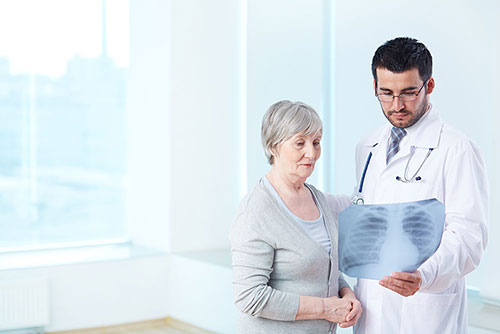What Is Pneumonia
Pneumonia is inflammation of the air sacs in one or both lungs. It is usually caused by bacteria or viruses. The germs may be breathed into other parts of the lungs also.

Why Is Pneumonia Important
Older adults (> 65 years) have a weakened immune system. Pneumonia can be severe in this age group and can lead to detrimental outcomes. The mortality ranges from 5% to 14% in the community and 30% in hospital admissions. 1 in 5 return to the hospital with unresolving symptoms within a fortnight.
What Are the Symptoms of Pneumonia?
The classic symptoms of fever, cough and breathlessness, will not be present in older adults. It may present in any of the following ways:
- Excessive fatigue and sleep
- Increased urination or retention
- Nausea and vomiting
- Experiencing a confused state called delirium
- Falls
- A decline from the previous functional status and mobility
- Loss of appetite
- Worsening of existing chronic medical conditions like kidney problems and heart disease
Since the classic symptoms are not present, this might lead to a delay in diagnosis and treatment, hence the prognosis. If any elders are showing these symptoms it is a must to bring them to the doctors notice.
How Is Pneumonia Diagnosed and Treated?
After a short clinical examination, a complete blood test is ordered to look at the counts and kidney function. Pulse oximetry, if you are having abnormal values, and arterial blood gas may be ordered. A chest x-ray to look at the focus and any fluid collection. If your symptoms are prolonged, you might need a chest CT scan, Sputum culture to look at the sensitivity of the organism. If you have fluid in the lungs, it may be aspirated and sent for culture also.
How Can One Prevent Pneumonia?
One can avoid getting pneumonia by staying in good general health, stopping smoking, and limiting alcohol.
And another way to prevent pneumonia is vaccinations for both flu and pneumonia. The flu vaccine is recommended every year just before the flu season. Flu season varies between regions. In Chennai, it is usually between September and December, and the cases peak in late October.
It is advisable to get it before the start of the flu season.
When it comes to preventing pneumonia, one needs to get vaccinated twice. Two vaccines, a conjugate vaccine (PCV 13) and a polysaccharide vaccine (PPSV 23) are available.
For people who have never been vaccinated for pneumonia, an initial dose of PCV 13 is recommended. This can be followed by PPSV 23 after a duration of 6 months to 1 year. For those who got PPSV 23 first, they can get PCV 13 too, after ensuring a year’s gap between the two vaccines. Following that, PPSV 23 can be taken in 5-year intervals.
Prevention is better than cure, so lead a life with healthy habits, get vaccinated, and age in a healthy manner.

Dr. Manicka Saravanan S
M.D Geriatric Medicine (AIIMS New Delhi)
Consultant Geriatric Medicine
Kauvery Hospital, Chennai

